If you find yourself downtown as the 90-degree dusk fades into sidewalk steam, and sweaty bodies on smoky porches start swaggering to slow jams, you could be Anywhere, USA, when summertime evening is taking flight.
But if it’s Sunday, the beginning and end of everything, and most of the surrounding streets are still; if the air’s trail of music leads to a small handful of places celebrating the laid-back workweek of a college town on break, then you may be in Bloomington, Indiana, where one bar in particular floats above a wide-mouth alleyway like a dock in a secret harbor. And where the voices on this specific karaoke night are seriously slaying it.
Inside, the diversity of song selection is matched by the people participating. A tall white guy sings Rihanna, his wide eyes earnest, reminding patrons that they are “beautiful, like diamonds in the sky.” There’s a visit from rising rock star Diane Coffee, whose electric howl through Bowie’s “Rock ’n’ Roll Suicide” sounds like Little Richard on acid, but perfectly pitched.
It’s the kind of scene where friends in conversation — Is that a new shirt? — interrupt themselves to throw their heads back in an impassioned sing-along — HELLO FROM THE OTHER SIDE — then pick back up — Where did you get it? Where a young black woman can then sing some obscure white metal-rap that for one hot minute gets people slam dancing to the oldies.
That’s a clever detail about this weekly event at The Back Door bar, presented by Misfit Toy Karaoke: People often dance. Not in the typical karaoke sailor way, swaying while shouting misheard lyrics. In the way, rather, that treats the performance — sometimes stunning, sometimes butchered — worthy of a trip to the dance floor. One minute this looks like a cluster of singular peeps in a house-music trance, the next there are ballroom-style couples twirling to a 1970s power ballad.
Misfit Toy owner Darran Mosley makes the social rounds, at times seducing the room with his bluesy renditions of Prince songs or Broadway musicals. And Karaoke Jockey Coley D holds court, calling on the crowd to cheer and finish her sentences. In many ways, she’s the star of this show.
All good KJs tend to be part entertainer, part Seinfeld Soup Nazi, and when Coley D’s not belting out her own R&B numbers, she’s supervising the stage. “This is an example of how not to do karaoke, you bitches,” she once announced as she cut short a group’s disorganized performance. “They got too drunk!”
Nobody has to be perfect here, but everybody knows not to waste Coley’s time. She might sing along if you need real help. She won’t do the jitterbugs in your Wham(!).
Tonight, though, her tough love is deliberately disarmed: She’s playfully forcing Culture Club onto unsuspecting punks and instinctively adjusting keys for voices she’s learned a thing or two about by now. A little bit of magic is moving the night along.
Perhaps it’s because of the missive Coley D posted on social media earlier on this day in June. “All I can offer is a safe place to clear your minds and hearts,” she wrote just a few hours after a shooter killed 49 people and injured dozens more at the Orlando gay bar Pulse. “Singing helps me get feelings out.”
Perhaps it’s the crowd’s primal need for this energy, like the woman with tear-stained cheeks who came here alone, remarking that after Orlando she “just wanted to be in queer space tonight.”
What’s also true is that here at The Back Door, Bloomington’s only LGBT bar, there’s always the potential to spark new chemistry in this toy chest of winged-lion action figures and rag-doll dandies looking for a home. The unicorn is in the details.
It’s unclear how everyone at The Back Door identifies. The space sometimes appears — in a stereotypical way that’s full of assumptions — about one-fourth heterosexual. What’s more evident is the racial makeup. While the latest U.S. Census shows Bloomington with a 5 percent black population, and even fewer people of Hispanic descent, karaoke night at The Back Door can at times see about one-third people of color.
There’s a role that music and performance have in fostering this mix. Politics and economics are also at play. Some customers may have originally entered this LGBT space as friends or fans of Mosley, the heterosexual black man who has spent the last several years curating and nurturing this super-fruity singing scene.
“I’ve always identified with the misfit,” says Mosley. If he was too ambitious and sensitive growing up in his tough Indianapolis neighborhood, he’d soon find himself too poor and black for Bloomington when he moved here in the 1990s to attend Indiana University. But he returned here soon after graduating, now working as an engineer for a local company.
A music lover, Mosley was frustrated by local karaoke offerings until he encountered a digital music file system at a bar in Indianapolis (the setup has newer songs and allows customers to sign up from a nearby computer or mobile phone). After an initial investment — and a successful karaoke birthday party for a friend — Misfit Toy Karaoke was born in 2009. The first regular gigs were at Uncle Elizabeth’s — “I owe them a lot,” Mosley says of the Bloomington gay bar that closed in 2014.
From the start, Mosley wanted a karaoke space like one he’d seen in Indianapolis: “It was gay, straight, hood, white, black … and it just was.”
The friends he brings to The Back Door include “black men who aren’t into hypermasculinity.” A successful karaoke performance, in his book, “comes down to how vulnerable you’re willing to get.”
Misfit Toy does gigs in various locations around town, and each place attracts a distinct crowd. But many people think what’s happening at The Back Door is culturally transformative, its diversity and ideology the future of LGBT space.
* * *
One significant fact is that The Back Door does not identify as a gay bar. It is, quite deliberately, Queer. This term tends to be more inclusive and also can carry specific political meaning.
There’s also a proud queer tradition of rejecting the mainstream, embracing those who violate norms rather than striving for normalization. (For this reason, many LGBT people reject the queer identity for themselves.)
“It goes to some function of the other — that’s why we use queer,” says Back Door co-owner “Smoove G,” who was part of a team that opened the space in 2013 at the urging of community members. After some reorganization, she was joined by “Nicci B.,” who relocated from Atlanta.
“We’ve made very intentional moves, uplifting specifically the disenfranchised people,” Nicci agrees. “And maybe they don’t all fit into the LGBT acronym as well as they’d like to.”
Regulars of all orientations are a part of queer culture, a scene these days that can include performance, protest, public discussion, and, at times, glitter.
Socially, queer space may strive to be more diverse than gay space, along all kinds of demographics. Drag at The Back Door, run by locally based drag queen Argenta Perón, is another attraction with some healthy variety, attracting performers of all backgrounds and identities.
Politically, the queer agenda has tended to de-prioritize goals like marriage and the military, focusing instead on economics, racial and gender disparities, or values like universal health care. Such issues may not have been gay enough for the mainstream movement, but they can be inseverable from queerness to those who occupy multiple identity categories. Recent bathroom-panic bills and the bloodbath in Orlando are reminders that many misfits are not protected by recent gay gains.
The flexible queer label may be more welcoming to allies, less willing to police the boundaries of sexuality and gender.
But who actually gets to claim the queer identity is increasingly the subject of debates around the country.
Meanwhile, media outlets report that momentum and revenue streams are drying up for gay-equality organizations, with some recent closures and mergers now that the big-ticket legal issues have been won.
On the heels of a gay-rights movement that has achieved so much integration it can scarcely maintain its own existence, then, the only space left for LGBT activism and counterculture may, in fact, be queer.
* * *
It could all be so simple, the Lauryn Hill song starts, and Coley D is already nailing it, her mighty pipes perfectly straddling the gospel-diva line. But you’d rather make it hard.
The typical rhythms of Back Door karaoke require the KJ to make split-second set list arrangements based on the tempo of attendees. If people are tired and need reviving, that’s a good time for Coley D to unleash her powerhouse vocals. If a dozen bodies are bouncing to the hip-hop sample she’s playing between songs, then your Johnny Cash downer probably won’t play next.
Coley’s final lines, sung in the universal language of tortured love — You said you’d die for me … why won’t you live for me? — build into a dramatic crescendo. If her voice doesn’t bring you back to hot asphalt streets where the album poured from every slow, jacked-up convertible, then you may at least remember how this early neo-soul music of the 1990s redefined possibilities within a genre.
That same era still offered legendary nightclubs where artists experimented with sound and performance. The famous ones, like New York’s Limelight, were known as places where populations mingled — typically, straight subcultures with a heavy gay presence. But Bullwinkle’s — a Bloomington nightclub from 1976 to 2006 — did its part to push the boundaries of art and acceptance in the Midwest. The now-defunct gay bar attracted LGBTs but also the “punks, geeks and freaks, goths and artists, grad students and Greek society people, whites and blacks and Hispanics, university folk and townies, young and old,” reported the Bloomington Alternative, because the space allowed everyone freedom of expression.
So, yeah, clubs with mixed demographics are nothing new. They may especially thrive in towns where nightlife choices are limited. As one of the only Bloomington dance clubs not overrun with undergraduates, for instance, The Back Door appeals to all kinds of adults. The gay bar Uncle E’s, when it was still open, also attracted a motley crowd on karaoke and performance nights.
“A lot of weird stuff happened,” Coley D chuckles about the early Uncle E’s days. The stripper pole, leftover from go-go nights, encouraged the previously prudish to strut their stuff during songs. Large groups of female friends started attending karaoke and drag nights, a presence that the regular old guard had to get used to.
“Oh, and remember the clown?” asks Mosley. “He knew he could come in there and sing a song in a clown outfit. And he could be safe.”
Social acceptance is still a key ingredient, but there’s something different about a mixed queer club in 2016. At Uncle E’s, for instance, “To be honest, they would call [karaoke] ‘straight night,’” Coley D remembers. At The Back Door, it’s simply “karaoke.” As the weeks turn into years it’s harder to place who might have once belonged elsewhere.
The story of integration is typically told as the masculine gay man joining the NFL, or the black woman in a corporate boardroom. It’s assumed that this post-gay/race victory-mix always moves in the direction of power, the minority adopting the majority’s norms and currencies.
Yet under the radar, other stories are growing, with fierce gusto: straight people integrating into queer culture; white queers aligning with communities of color. From the outside, these social and political spheres may seem like they are “for everyone.” But they exist primarily for minority sanctuary and empowerment. And the potential of this new-mix movement should not be underestimated.
Perfectly at home with being queer, Coley D and Mosley stop short of publicly claiming the label for themselves. Both have their own “coming out” stories of sorts — moments when they realized “something’s wrong” about what they were supposed to be feeling and doing — when they shed their former selves or ran away to Vegas. Both also participate in other Back Door events, like drag nights or the recent Pulse-Orlando fundraiser. There’s no question that they are not visitors here; The Back Door is their community.
Ironically, the gay bar in more diverse cities is often more homogenous. If there’s a drag bar, a twink bar, a bar for black bears … then the queens, twinks, and bears don’t mix. It’s when these niche venues disappear, notes Marlon M. Bailey, Ph.D., a gender studies professor formerly at IU and now at Arizona State University, that these cities may see more of an assortment in their clubs.
How various social groups come together is certainly influenced by music. Participation in a space is still largely determined by race, class, and sexuality, but a club’s music and performance lineup “can potentially extend the boundaries of separation,” says Bailey.

Marlon M. Bailey, Ph.D., a gender studies professor formerly at Indiana University and now at Arizona State University. | Courtesy photo
Music can also serve to exclude people. When the black gay bar The Catch closed in Los Angeles last year, patrons told their local media that they could not find a welcoming alternative; some gay clubs were deliberately changing their music to reflect a whiter sound.
Across the country, gay clubs of all stripes are closing as rents rise and patrons (some of them also priced out of the area) drop off. Some people say the decreased demand for gay and black spaces is progress, a sign that fewer sexual and racial minorities need to socially segregate.
Others believe the main reason for decreased nightclub traffic nationwide is that dating has gone digital. With hookups so readily available from one’s phone, the clubs lose the customer whose primary reason for attending was sex.
Bailey, whose 2013 book, Butch Queens Up in Pumps, documented black vogueing culture in Detroit, is troubled by the social consequences of app-based dating. Performance in LGBT and minority space not only builds community, it serves to display and preserve a culture’s rituals. “All of that public culture … you can’t get that online. You have to go out,” he says. “That we have ‘arrived’ makes these bars all the more important. … Marriage is a privatizing entity, and we need public culture.”
Of course, karaoke bars were never a hotbed for the non-ironic Zoolander gaze anyway. Hookups happen, but these are people who may reveal their most embarrassing sides long before it’s time to ask them home. There’s a reason that public performance tends to survive the ups and downs of societal romance trends, why karaoke nationwide is experiencing a renaissance and why drag never died. The whole point is to connect as a group.
Those dynamics have fueled some of the longest-running LGBT bars across the country. Chicago’s Big Chicks, welcoming “men and men, women and women, men and women” has been in business almost 30 years. Mary’s bar in Atlanta is world famous for its mixed clientele, karaoke, drag, and dance parties. Last week it was announced in San Francisco that The Stud Bar, a 50-year-old institution known for its mixed crowds and performances, will be saved from eviction by a gang of drag queens, artists, and politicians.
Today’s mixed queer bar is, in some ways, a return to basics — a place for freaks to find family.
* * *
When The Back Door first opened, an acquaintance remarked that it was the “straightest gay bar” he’d ever attended. Although I hadn’t been there yet, I knew he was reading it wrong. Obviously there are friends and allies at the bar. But queers can be mistaken for straight. Or they may date straights. Or be queer and straight. Or gay. Or not.
I also knew something about Smoove, having met her when we both lived in San Francisco. That’s a city that keeps people young — mostly by forcing them to have several roommates until they’re 50 — and Smoove had a room to rent close to where a condo project had evicted me from my flat. I was 30-something (18 in SF years) and newly single, and I argued that she should let me sleep in her storage room so I could bring home strangers without waking anyone up.
That’s not why it didn’t work out. I moved downtown instead, but not before we’d spoken about her chill attitude and inclusive approach to community. The next time I saw her, we were both in Bloomington, and I was all like, Hay-ay! at The Back Door’s très-gay décor and its tribute to the unicorn, deity of ancient queer peoples.
Hanging out at The Back Door on a recent afternoon, Smoove and Nicci tell me that their house rules help sustain the bar’s queer — and safe — culture. A sign at the entry threatens to publicly shame predators and to toss unattended drinks. Customers are encouraged to report or discuss bullying and disrespect if they see it. A gender-neutral bathroom policy (not no policy — the bathrooms are mixed, too) has virtually eliminated any restroom conflicts.
(Well, okay, except for that dude who couldn’t stop telling me how small his package was. Seems some straight men are more nervous about other guys in the restroom. Don’t bother looking, he said, it’s hardly even there. GOT IT.)

House rules at The Back Door help sustain the bar’s queer — and safe — culture. | Photo by Natasha Komoda
The bar has an educational component, like its queer antagonism and revolt film series, and there’s strong pro-minority messaging. How many other bars feature Black Lives Matter on their Facebook profile? When The Back Door attracts mixed demographics, it’s no accident.
Does it matter? Or does the importance of solidarity in social scenes stop short of effecting political change?
For Smoove and Nicci, “everything is political,” and what happens in social settings is no less significant.
Bailey believes clubs that serve as a sanctuary for minorities are still transformative. A DJ or MC — through the music’s lyrics, or through call and response over the mic — is able to express “political messages that help people evolve, communicating to the crowd messages about being proud, being free.” This experience of renewal is why some people referred to Pulse-Orlando as their church.
* * *
The media has long since buried the Pulse tragedy, but the story actively smolders in LGBT communities still stunned by a response that both ignored and perpetuated homophobia and racism: the political refusal to acknowledge gay and Latinx people as targets, accompanied by an insistence that the problem was the shooter’s race and religion.
It’s tough to find LGBT people who ever believed Orlando was an Islamic terrorist attack. They know too much. Came of age getting bashed and probably asking for it. Must have kissed someone on the corner, or been slight-framed and silly. Must have been sick.
Long past Stonewall, violent laws and speech prevailed. Many still count the friends they watched wither of AIDS and sweat to nothing while the country turned away. Most remember how The Jenny Jones Show murder gave “gay panic” respectability, and how, a few years later, two boys strapped a bloodied Matt Shepard to a fence to teach gay people “not to come on to straight people.” In the 1990s — actually celebrated for gay-positive media — TV showed preachers and senators sneering in homo-revulsion while cameras panned stadiums of people cheering them on. Imagine, as a young or discarded person, that being your prime time. This was almost yesterday.
The past few years of progress, then, have been unsettling. Same-sex marriage barely raises any brows. Hets and homos strip to skivvies together in barracks. Kids everywhere have memorized the musical Fun Home’s masculine-female anthem, their proud parents uploading these recitals online.
Who do you have to gross out to be a pariah anymore? Unless you’re a pedophile or adult-baby on welfare, it seems harder to be hated these days.
Easy for this white writer to say amid a violence epidemic against people of color, including many transgender women. But when a black president’s administration tells the trans community, “We see you” — much as that can sound like old-fashioned surveillance — one realizes how mainstream the misfit has become.
Still, it’s no breathe-easy, and the backlash to minority progress has been swift. The hatred revival tour, starring RFRA and the Imaginary Toilet-Monsters, had made several stops around the country when Orlando blasted in for the encore.
Most of the gay and queer people I spoke with had immediately assumed the Pulse shooter was a religious zealot fed by American biases around him. Subsequently learning that he was Muslim and maybe questioning his sexuality did not change anything.
“The idea of what he did,” says Nicci, “was 100 percent American.”
Queer writer Eileen Myles said much the same in a blog post. “We are killing the most vulnerable ones among us, the ones who felt that bullet all their lives,” she wrote for Literary Hub in June. “We grow up knowing this inside. That America wants to kill us.”
Later, when I have a chance to workshop this article with Myles, she says of the Orlando killer, “ISIS was his beard.”
* * *
Immediately after the massacre, an emotionally raw Nicci set out to provide refuge at The Back Door to her community. It led to some difficult conversations, asking previously scheduled musicians — mainly, straight white men — to take a back seat while she prioritized queer programming.
In a crisis, even inclusive spaces may need to draw a line. For many like Nicci, the queer line can’t be just “every white weirdo”; a person who claims the label should be marginalized in some way.
“It’s very precarious because all these people want to be like, ‘Well, I’m different, too,’” she says.
The inclusive appeal of the word queer serves as its potential downfall, writer Jenna Wortham argued in a New York Times Magazine column last month. “Plainly, we are in the midst of a profoundly exhilarating revolution. And queer has come to serve as a linguistic catchall for this broadening spectrum of identities,” she wrote. “But when everyone can be queer, is anyone?”
A couple of weeks later, Bloomington’s own Queer Talk series tackled the definition of queer, asking, “Does it even matter, as long as we’re using queerness to smash cisheteropatriarchy?”
Originally a slur, queer was reclaimed decades ago by certain sexual minorities. For a while it seemed like a new type of gay person. Then it was more of a political affiliation, where the fearless bad-assery of protest culture was preserved. Not Gay as in happy, an old saying goes, Queer as in fuck you.
Now it can be a sexual identity in its own right. Queers today may skip the gay, coming out from the start as the big bad Q. They may be same-sex oriented (but to hell with your definition of same or sex). Or they may have always been straight, now partnering with a person who is LGBT. It’s not always a gut-wrenching “coming out” anymore to leave the heteronormative world; could just be, as one person on social media described their recent queerness, “the difference between being content in one life vs. blowing my own mind.”
But that doesn’t mean there’s no more stigma. In fact, argued writer Hugh Ryan, Wortham’s NYTM piece defines queer incorrectly. “To be queer is to be judged, and to find community with others who have been judged similarly,” Ryan wrote for Slate.com. “By focusing instead on inclusivity, Wortham’s article actually does the very thing it worries about: It depoliticizes the word. Queer goes from being a label that allowed the development of community across sexual identities to one that disavows that community.”
Not being tied to the community, in other words, is not queer. That kind of erasure is what brought us the colorless, queer-blind sound bites that claimed the Orlando victims were just Americans, worse yet, humans, because we needed reminding.
De-gaying Orlando meant the blame could be foreign. Politicos could pretend America’s potty talk and border rants hadn’t just painted a bullseye on this successful hit. There’s a reason the North Carolina governor’s condolences made homos feel homicidal. (How many victims hid in the wrong bathroom anyway?)
Re-gaying Orlando happened only to put blame on a so-called self-loathing closet case — See? Nobody hates your community — once it was discovered that the shooter used gay dating apps and went to the bars. (Read New York University Professor Lisa Duggan’s rebuttal to this perception.)
Orlando’s aftermath instantly revealed the deceptions and failures of integration. The victims, even when de-gayed, weren’t American enough after all to warrant much mention. LGBTQs experienced this mainstream social-media silence painfully. Hell, this country even forgave our freedom-fry fight to claim I am Charlie and I am Paris. But not too many want to post memes for I’m the brown fag pulsating under Florida strobes.
One summer night, Back Door karaoke unfolds like a tribute concert to the highs and lows of real life. Whitney Houston’s “How Will I Know” gets as many people moving as Ed Sheeran’s questionable promise to love someone until they’re 70.
There’s a brief lull when early exits and smoke breaks disrupt the momentum. But who are these starch-collared 30-somethings in cuffed shorts? Their nerdy little group gusts in around 1:30 a.m. to deliver an Amy Winehouse medley that shakes a second wind into the place. Strangers are high-fiving; several free drinks are delivered to Coley D’s station. By 2 a.m., everyone left over may be truly certifiable, but they are feeling the love.
The Pulse shooter was not a member of the gay community, any more than the years-ago bathroom arrest of a senator gave queers a dirty new leather daddy. The media has promoted simplistic conclusions about desire and expression that prevent a deeper understanding of identity. It’s why we still ponder false binaries like biology vs. choice. Why Matt Shepard’s killers would one day “retract” their anti-gay motives for the murder, as though they could retroactively omit the terror imparted on a gay generation.
Whether Orlando is now reported as an “inside job” or a complex tangle of religion and society, it’s impossible to erase all the cultural cues that mark some bodies as easier prey.
At The Back Door, another beer-buzzy calm hits just before closing at 3 a.m.; on this night, all eyes in the half-empty bar are fixed on the stage.
Coley D queues a Rage Against the Machine track and walks to the mic. A small guy follows her, tosses about his arms, and chants: Some of those that work forces / are the same that burn crosses.
One by one, people join the stage — that guy who sometimes drinks with Mosley … Ugh! Killing in the name of … that tall tomboy who usually shows up at the end … Killing in the name of …
It’s late and they’re bleary but they’re all lined up horizontally, throwing hand symbols to make any album cover proud. And then it’s all of them, Fuck You, on repeat, I won’t do what you tell me.
Gradually louder: I won’t do what you tell me!
Soon the silhouettes shed their composure. Some move in fits, they starve, look at one another; others go still as the music passes through them.
This spontaneous incantation gripping the room, my table sits in captivated silence, registering the moment as a kind of people’s history. I WON’T DO WHAT YOU TELL ME! Like it’s our duty to witness here what not everyone gets to see: bodies that have paid a price in this world, opening themselves up to anyone who will listen.

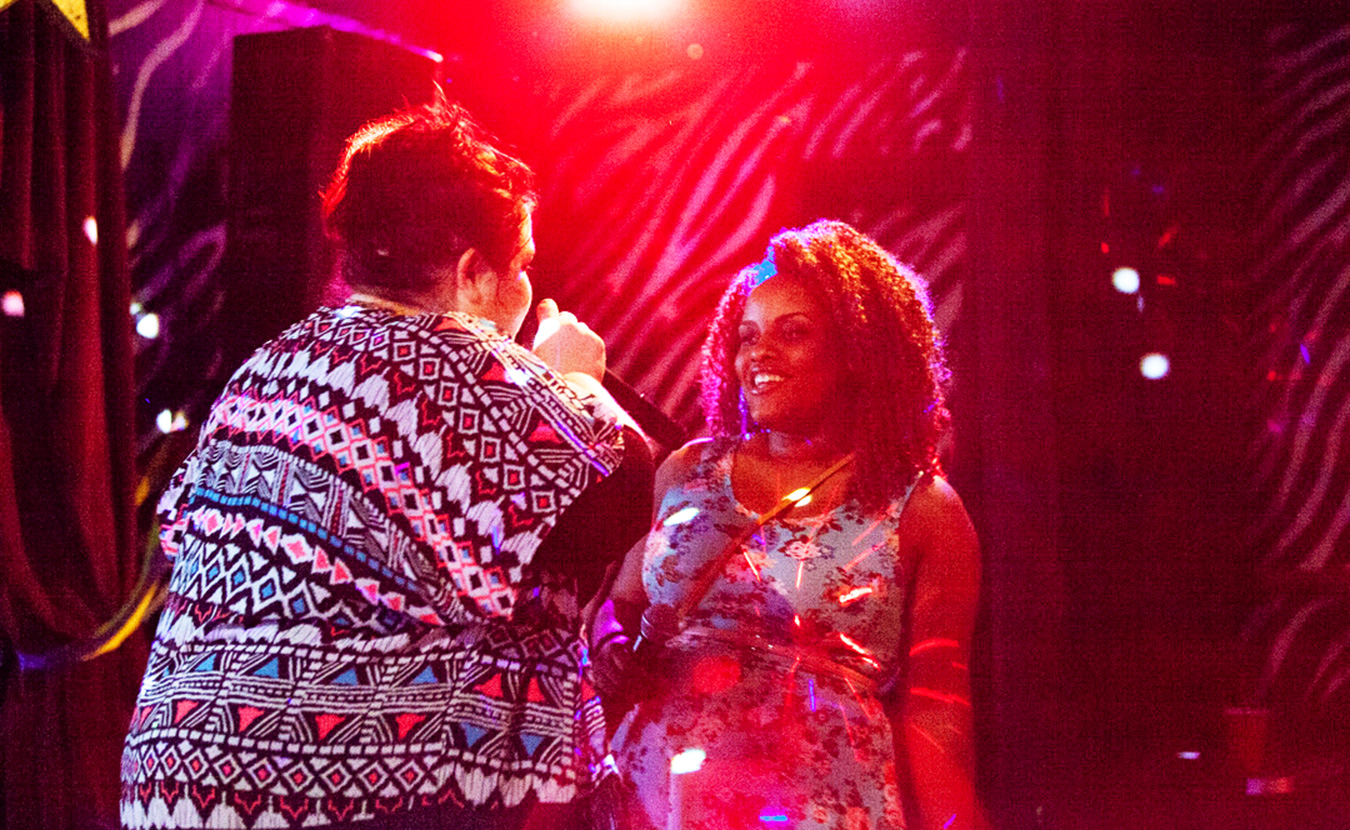
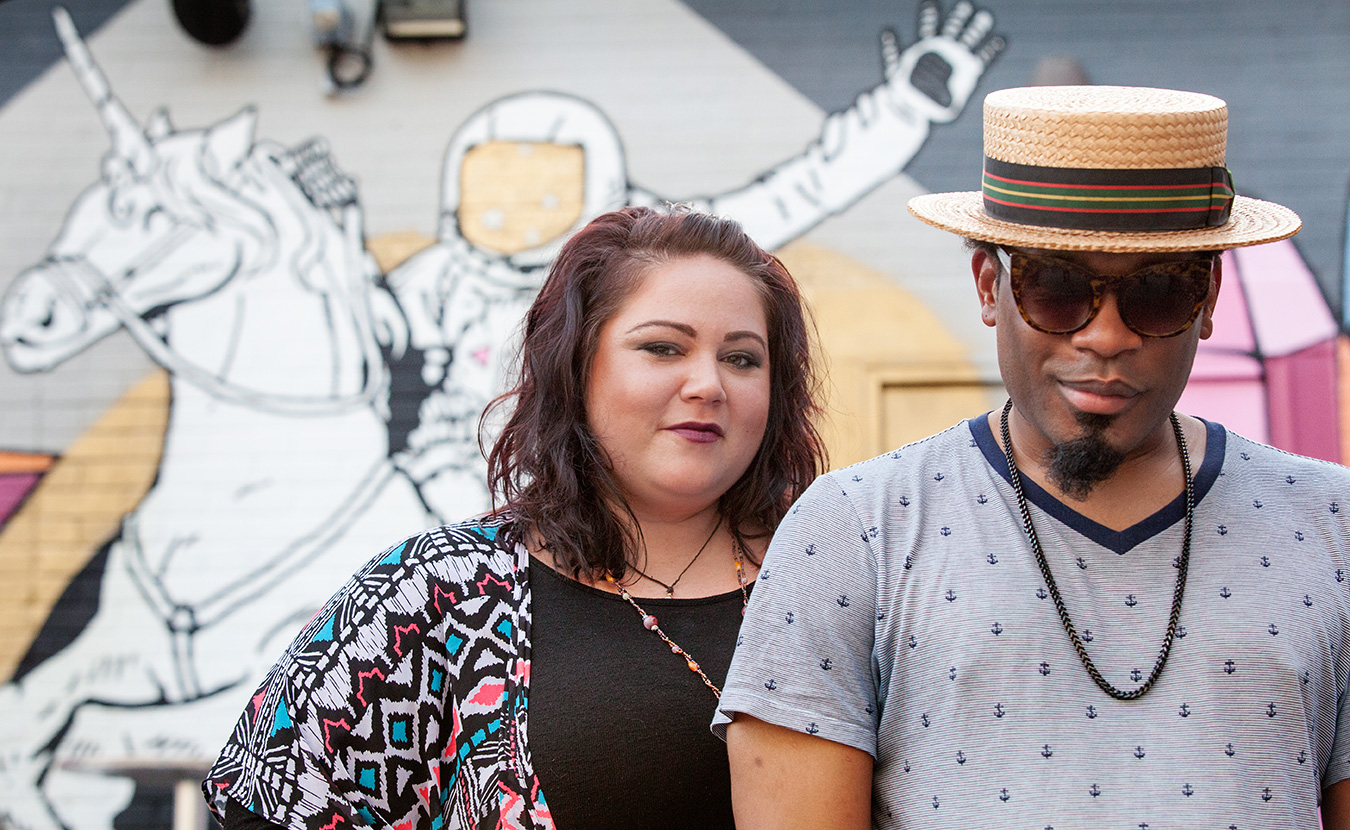
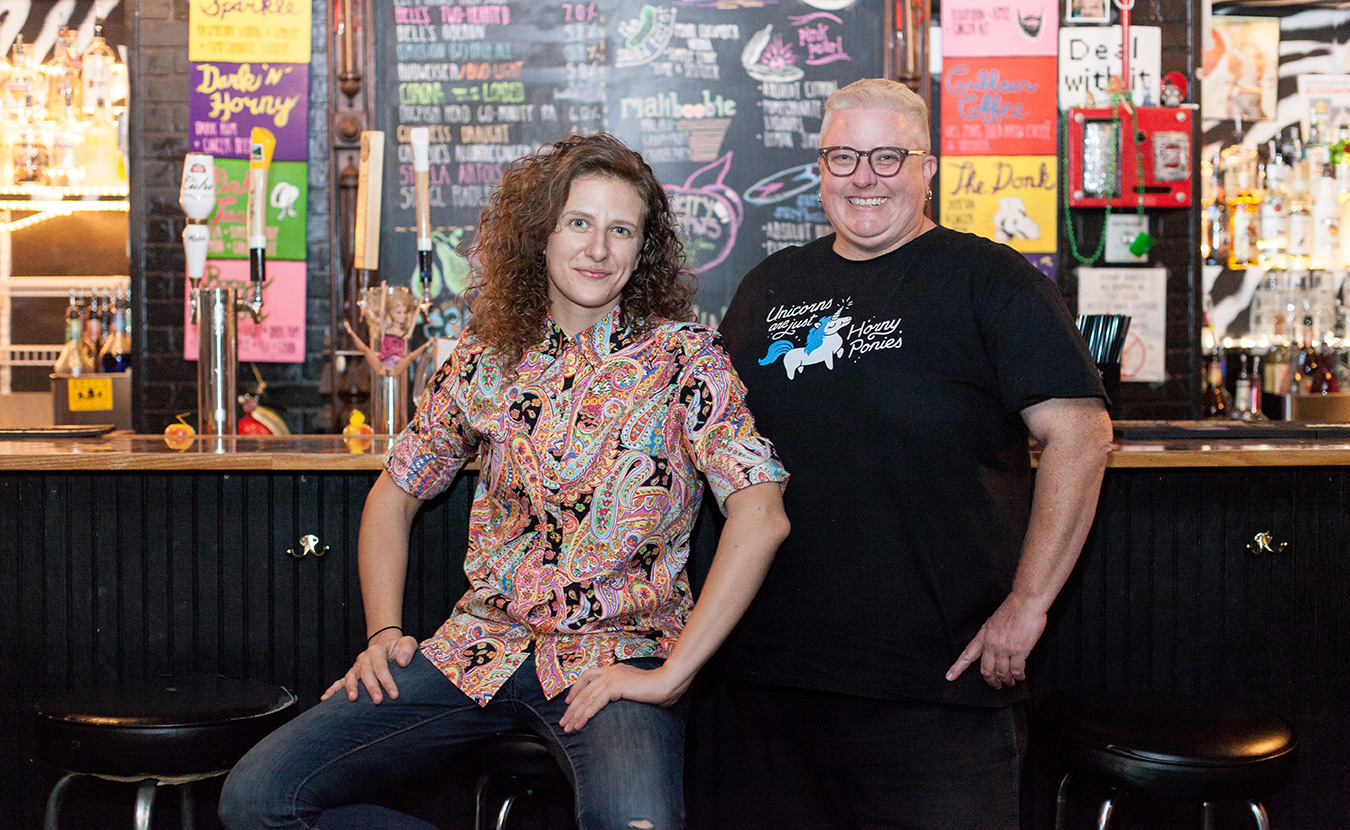
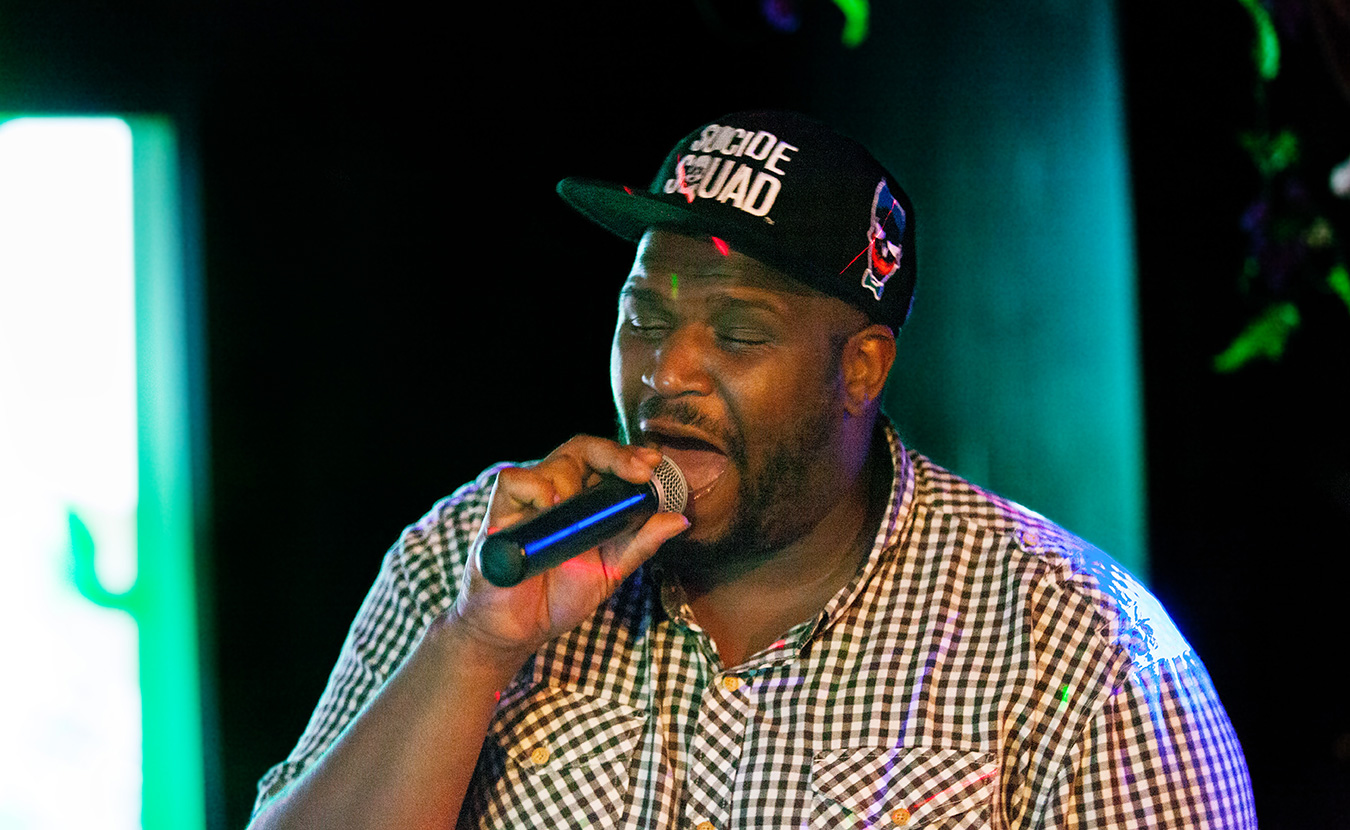
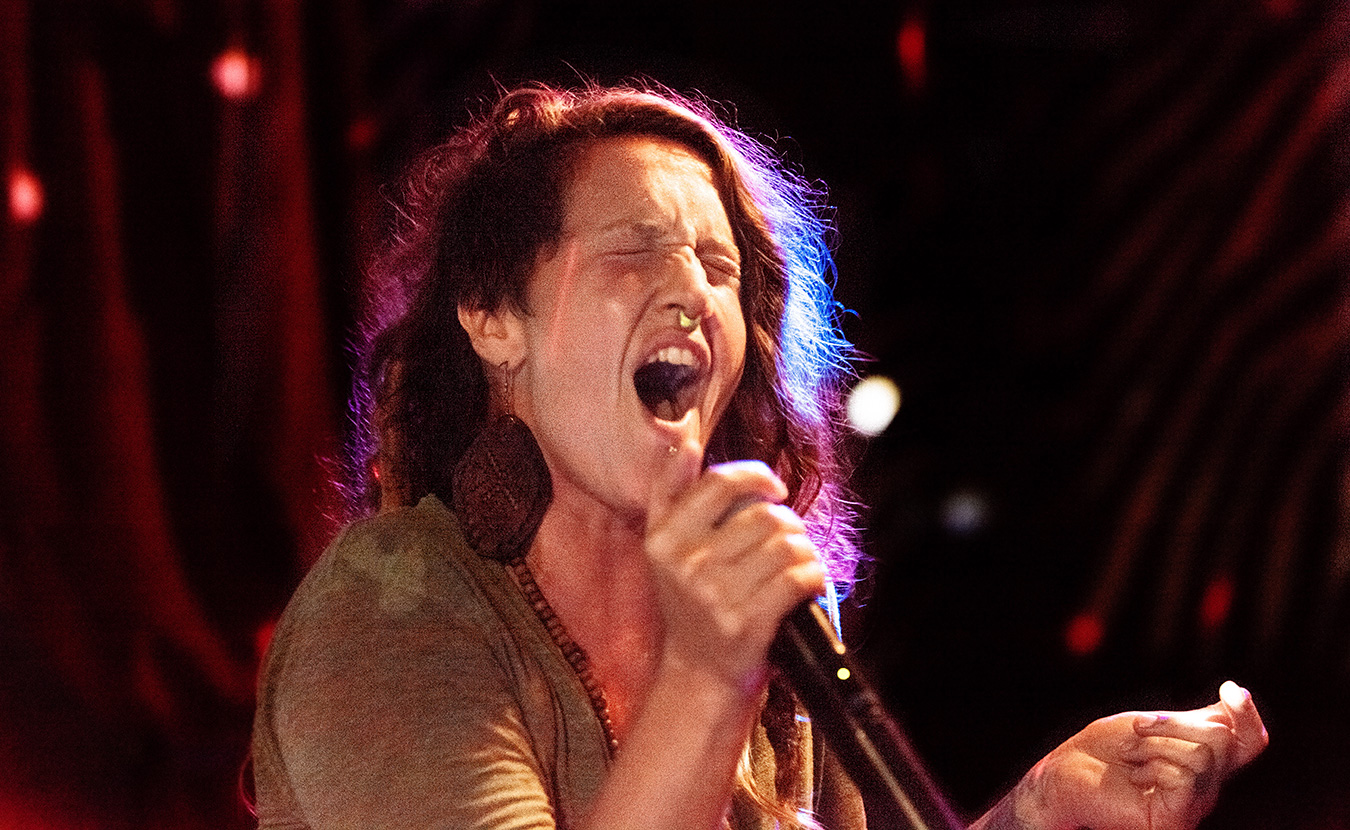
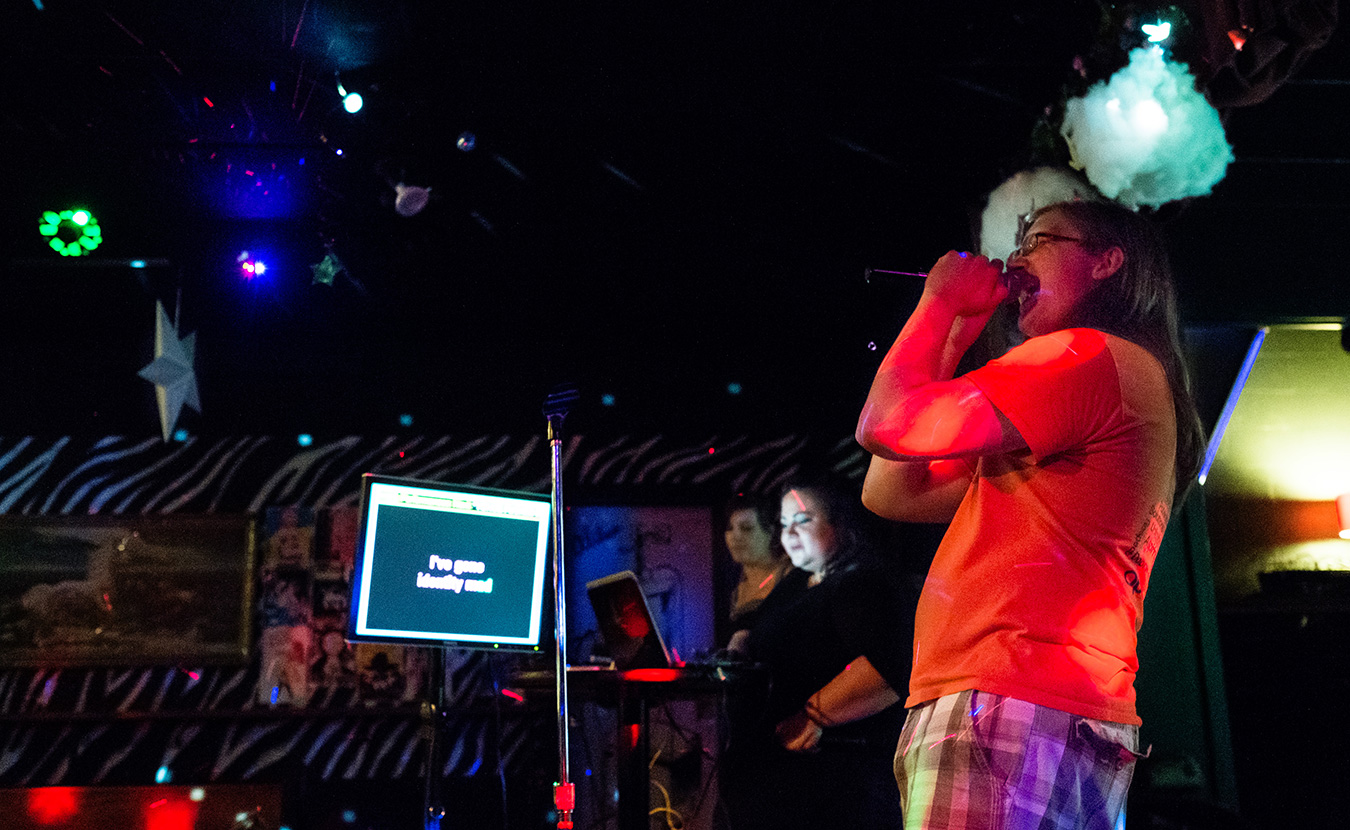

No Replies to "Queer Space, Post-Orlando: Can Karaoke Save the Misfit?"